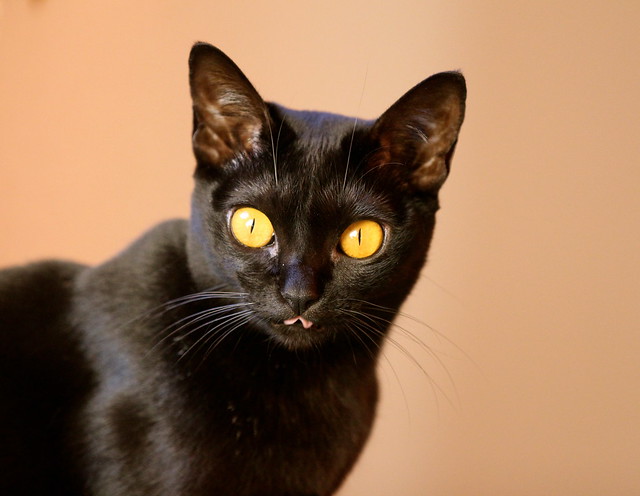A shorthair felid, Bombay was created in nineteen fifties in United States through crossing of American Shorthairs with Burmese cats. The idea was to creature a small Indian 'black panther'. After a number of attempts, finally an all black cat was developed that would consistently produce black colored kittens with 'copper penny' eyes. It was named 'Bombay' after the famous Indian coastal town of the same name. It took a further two decades for the cat to be formally recognized. The modern Bombay shares majority of its attributes with the Burmese since American Shorthairs are no longer used in the periodic outcrossing of the breed.
 |
Bombay Cat - Photo by sebadore  |
A lithe yet muscular cat, Bombay is surprisingly heavy for its appearance. It has a medium slender physique with a shiny coat. Head is well rounded with gold to copper colored circular eyes and slightly tilted ears. Both the eyes and ears are big and widely set. Muzzle is short with a minimal nose break. Legs are long with round paws. Tail is medium in length. The highlighting feature of the Bombay is its stunning lustrous coat. It is short and close lying and yet has an unparalleled shine. It is black throughout, including at its roots. Sable colored kittens are often born in litters, though they are not formally recognized by cat fancies.
Some Bombays share a hereditary skull disorder with the Burmese in their lines. The result is an abnormal craniofacial presentation in kittens who are unable to survive and thus have to be euthanized at birth. This is an issue of some controversy around breeders today of the traditional Bombay and Burmese cats.
Affectionate and calm, Bombays are famous for being total lap cats. They follow their humans around everywhere and try to supervise all their activities. They are outgoing and active cats and keep themselves and their companions busy. Temperamentally they are quite good. Bombays readily accept other pets, particularly dogs, into their household. They are cool with children and are social cats in general.
The author is a blogger about cats and an expert on Bombay cat. Article Source: EzineArticles |

No comments:
Post a Comment